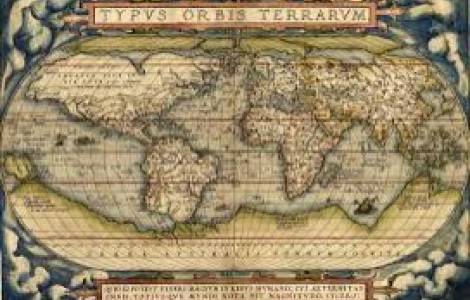
by Gianni Valente
Rome (Agenzia Fides) - The speech that the Bishop of Rome addresses every year to the Diplomatic Corps accredited to the Holy See is not just an expression of the current Pope's "personal opinion" on the state of the world. In modern times, it is even more evident that the contribution of critical thinking that Pope Francis is making to understand the true nature of the cruel conflicts and the unprecedented propaganda mechanisms at work on the world stage is based on a long tradition. The historical uniqueness of the Holy See, recognized by governments around the world as a sovereign subject empowered to intervene diplomatically in international scenarios, comes to the fore. The work God's Diplomats, published in 2021 by Victor Gaetan, an experienced journalist, writer and analyst, collaborator of Fides Agency, has effectively and suggestively highlighted all the factors - historical and genetic - that contribute to determining the uniqueness of the Pope's diplomatic network. The text, published by the American publishing house Rowman & Littlefield and accompanied by a subtitle full of suggestions (Pope Francis, Vatican Diplomacy, and America's Armageddon), moves in wide horizons, and reasons on the long term, those not contemplated by the dictatorship of the instant-book.
"Catholicism," as Victor Gaetan repeatedly emphasizes, is the only universal religious community that is internationally recognized as a "sovereign entity" and has an "international personality" that allows it to exercise diplomatic prerogatives reserved for sovereign states. Papal diplomacy and its structures are completely embedded in the network and practice of relations between geopolitical subjects. She follows the rules and protocols of the diplomatic game. Nevertheless, it is marked by characteristics and operational criteria that often reveal the actual mysterious source from which its genetic anomaly arises.
The enduring diplomatic projection of the papacy and the Catholic Church is, above all, a product of history and has emerged through the interaction of given circumstances. It is certainly also the legacy of the centuries in which the Pope and the Papal States were historically integrated into the system of relations and conflicts between pre-modern and modern states. His “being there” is therefore not justified by a “divine right” and it retains the character of chance. The entire diplomatic network of the Holy See could dissolve tomorrow, and the Catholic Church could continue through history without losing an essential feature of its sacramental and apostolic nature. But in changing times, this instrument, which cannot be reproduced by the mechanisms of institutional technology, with all the baggage of its thousand-year history, can continue to be valuable in the new contexts that the Church has to face throughout history. The uniqueness of the diplomacy associated with the Apostolic See is, in its own way, also reflected in the special characteristics of its “modus operandi”. Despite many contradictions and human aberrations, the mission to proclaim the Gospel and the underlying reference to natural law serve as a compass against which the use of the diplomatic instrument can be reoriented. A dynamic that has been able to unfold with greater authenticity, especially since the Catholic Church was liberated from the cumbersome burden of the Papal States and the secular power of the popes. In his book, Victor Gaetan describes the unique “modus operandi” of papal diplomacy as “long-standing practices” of the papal diplomatic and geopolitical initiative: the effort not to be crushed by one side or the other in conflict situations; the contribution to overcoming geopolitical disputes without creating "triumphalist" winners and humiliated and resentful losers if one really wants to preserve peace from the resurgence of hatred; the ability to seek and promote dialogue with everyone, including interlocutors branded as "unimaginable" by major powers and supranational institutions; the tendency to use the human resources of patience to the utmost to untangle seemingly inextricable knots without imposing any conditions. The intension to create networks, to look for "common ground" in order to unite different and opposing interests, always favoring the ways and solutions that save specific people suffering. "If it were a question of saving even a single soul, of averting greater harm to souls," said Pius "In this way we would have the courage to deal with the devil himself" (Speech to the professors and students of the Collegio di Mondragone, May 14, 1929).
The historical interconnection between the role of papal diplomacy and the mission to proclaim the Gospel of Christ was also the focus of an international colloquium recently organized in Paris by the Missions étrangères de Paris (MEP). The colloquium entitled "The Holy See today: Worldmmission, evangelization and papal diplomacy", which took place on December 9th at the headquarters of the "Missions étrangères de Paris", was intended to document how the Holy See, also with the help of papal diplomacy, "carries out its high mission of proclaiming the Gospel and establishing peace for all while maintaining its neutrality and even impartiality. The speakers also included invited representatives of the archives of the Holy See. In his lecture, Father Flavio Belluomini, archivist of the Dicastery for Evangelization, illustrated how the representatives of the Holy See scattered around the world - diplomats in themselves - always worked closely with the Congregation “de Propaganda Fide”, which they and their networks also help to maintain relationships with the missionaries. As early as March 8, 1622, according to Father Belluomini, the members of the newly founded Congregation “de Propaganda Fide” had designated thirteen different areas of the world for missionary work and called in nuncios and apostolic representatives to monitor this work. The contribution of the archivist of the Dicastery for Evangelization focused on facts and experiences from the 17th and 18th centuries. After him, Professor Claude Prodhomme from the “Université Lumière Lyon 2” gave a lecture on diplomatic activities in favor of the universal mission of the Church in the 19th and 20th centuries. (Agenzia Fides, 8/1/2024)
